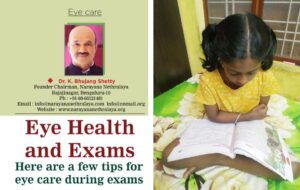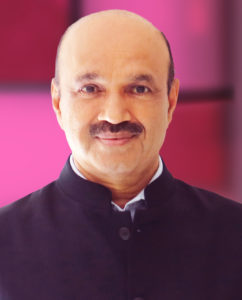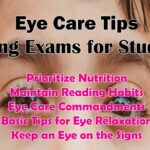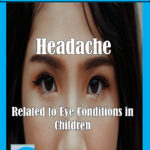Eye health during exams is usually neglected. Due to the pressure of the exams, there is bound to be physical and psychological stress. Children are usually advised to take nutritious food and adequate sleep. Here are a few tips for eye care during exams.


March is the month of exams for most students. We find children putting in about 6 -10 hours of intense study per day during this time. Due to the pressure of the exams, there is bound to be physical and psychological stress. Children are usually advised to take nutritious food and adequate sleep. Eye care and health is usually neglected.
Here are a few tips for eye care during exams.
1. It is advisable to wear the glasses prescribed when studying, even if you can see clearly for near without glasses.
2. If you are using contact lenses, do not use them for more than 12 – 14 hours/day.
3. Follow the 20-20-20 rule during prolonged hours of study. If you study for 20 minutes, look out of the window for about 20 secs, at an object which is about 20 feet away. This helps to relax your eyes and relieve eyestrain.
Also Read: What is Computer vision syndrome and how to reduce the effects?
4. Since you have to do a lot of near work during your study, avoid watching TV and playing games on your mobile or i pad. Instead you could go for a walk to feel refreshed and relaxed.
5. It is advisable to keep the reading material at a distance of 1 foot and that the light fall on the print and there are no shadows on it. You should not slouch over the table/ or read in awkward positions. This might lead to neck pain and headache.
6. Lubricant eye drops can be used during the exams after consultation with your eye doctor.
7. Prolonged near work with an overlay of mental stress can sometimes cause a condition called spasm of accommodation in some children. This causes blurred vision, eyestrain and pain around the eyes. This condition can be prevented by following the above tips.
8. At least 6 hours of sleep and a healthy diet with adequate water intake are also equally important.
9. Eat right for good eye health – A diet rich in citrus fruits, green leafy vegetables, eggs, nuts, omega-3 fatty acids, lutein and zinc, can help ward off age-related vision problems like macular degeneration and cataracts.
10. Ensure that you rest your eyes properly by getting a good night’s sleep. Inadequate sleep may contribute to eye fatigue, puffy and dry eyes, eye spasms, popped eye vessels and dark circles. Good sleep (7-8 hours) rests the eye muscles and provides the necessary fluid circulation.
11. Exercise regularly and maintain a healthy weight – Regular exercise stimulates the entire body, lowers your odds of obesity, and can reduce your chances of developing serious eye diseases such as diabetes (which can lead to diabetes-related eye disorders and blindness), glaucoma, and macular degeneration.
12. Wear sunglasses when out doors to protect your eyes from the harmful effects of UV light. Too much UV exposure increases your chance of cataracts and macular degeneration.
13. Make sure you drink sufficient water to avoid dehydration – which can lead to reduced tear production, dry eye, eye strain, blurred vision and headaches.
14. Be aware of your family’s eye health history– as some eye disorders are hereditary. This will help to determine if you are at higher risk for developing a hereditary eye disease or condition.
Good luck for your exams!


Dr. Bhujang Shetty – Chairman
Narayana Nethralaya
121/C , 1st ‘R’ Block, Chord Road
Rajaji Nagar
Bangalore – 560010
Ph: o8o-6612 1401-1402











